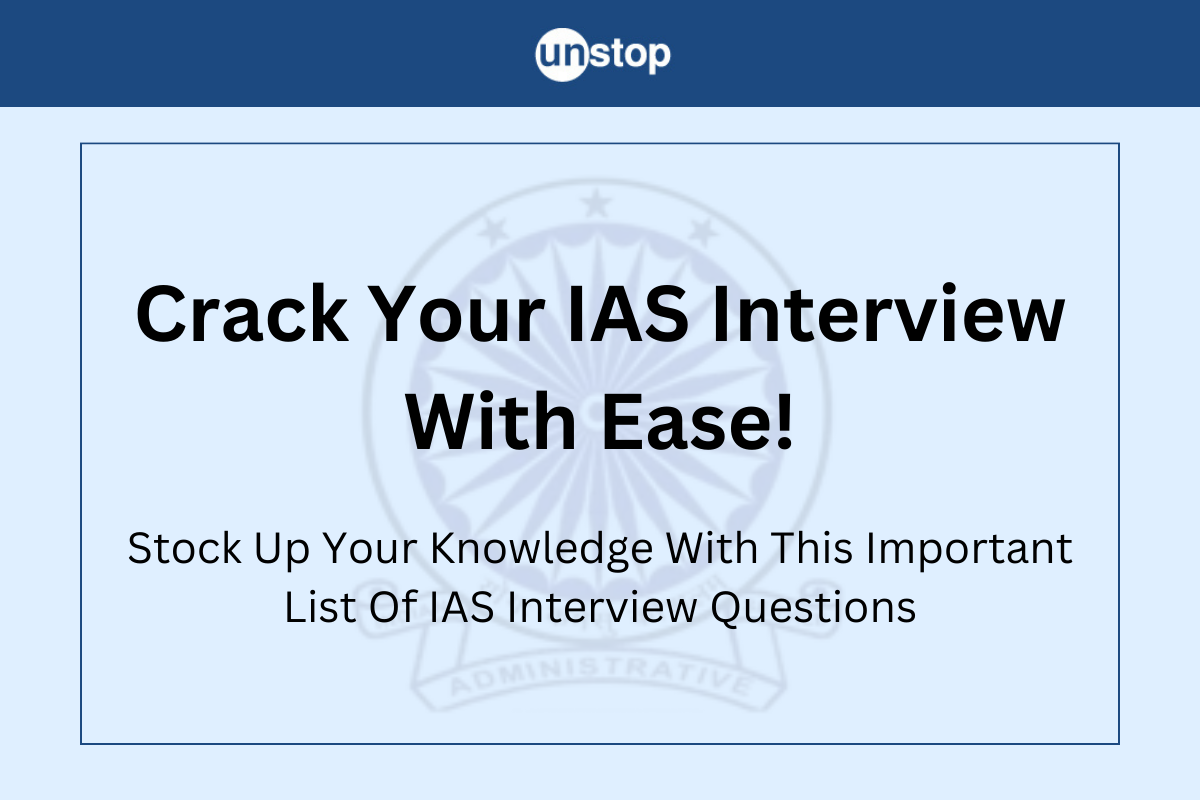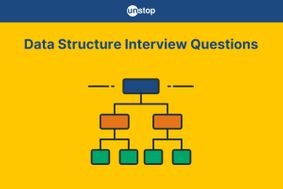- IAS Interview Questions: Prime Objective
- Important IAS Interview Questions - General Awareness
- IAS Interview Questions Related To Self-Introduction
- IAS Interview Question Related To Optional Subject
- IAS Interview Questions Based On Job Profile
- Most Effective IAS Interview Preparation Tips!
IAS Interview Questions (2026): 40+ Important Questions With Expert Answering Tips

The Indian Administrative Services is one of the most coveted jobs in India. Each year thousands of candidates take the IAS exam, popularly known as the Union Public Service Commission exam or UPSC CSE, but only a handful of candidates actually make it to the selection list. The exam is conducted in three stages, namely the preliminary test, the main examination, and the IAS interview, and every stage is critical for getting the IAS tag.
In this article, we will go through the different types of IAS interview questions that are generally asked in the PI round. Since the UPSC interview questions span topics across subjects, we have tried to cover questions from different domains. But before you take a look at the IAS interview questions, let's see why the UPSC interview is considered a tough nut to crack!
Pump up your confidence with a mock interview! Click here to book a virtual session
IAS Interview Questions: Prime Objective
The UPSC exam is a highly competitive examination. The difficulty level of this exam can be understood by the fact that only one out of every three candidates makes it to the final interview round.
The final stage tests more than just the theoretical knowledge of the candidate. The highly qualified interview panel intends to assess your basic clarity about various fundamental concepts, presence of mind, your hold on current affairs, as well as your communication skills.
Kothari Committee (1976) spoke about some characteristics of a civil service aspirant that must be looked into during the Civil Service Examination. These are:
- Clarity of expression
- Reasoning Ability and general awareness
- Ability to consider different viewpoints
- Awareness of socio-economic problems
- Have a range of interests
- Be able to interact effectively with people and have leadership skills
- Intelligence, presence of mind, honesty, and empathy
So whether you are an average student or a topper, the above personality traits can help you nail the IAS interview round.
"A test is designed to separate candidates into ‘better qualified’ and ‘less qualified’, better qualified are those who have done better at the examination. Whether they would also make better officers in their service career is a different matter. This would depend upon the degree of correspondence between the characteristics measured by the examination and the attributes and qualities which would go to make a successful officer. This is usually referred to as the validity of an examination, and its estimate is not easy." -Kothari Committee Report on Recruitment Policy and Selection Method

Important IAS Interview Questions - General Awareness
The difficulty level of IAS interview questions may vary from person to person. In fact, every candidate has a different interview experience. But to give you a gist of the type of questions asked during the UPSC interview, we have curated this list of important IAS interview questions for you. Have a look.
Q1. Why have you opted to become an IAS Officer?
This is one of the common IAS interview questions. So, if you are going for the UPSC interview, this answer must be deeply embedded in your mind. However, during the UPSC interview, you need to shape your answer in a crisp yet convincing manner. Through this question, the panel will judge your motivation level, clarity of thoughts, and real objective behind joining the services.
You can say that you want to bring positive societal changes through your work and conviction. You could quote some real-life experience that might have motivated you to pursue IAS as a career. While every candidate has a different answer to this question, one must ensure that the answer doesn't seem far from reality. You must state your objectives for joining the service and give an original, diplomatic, and honest answer.
Q2. You were born on xyz date. Can you talk about any important events that took place on that day?
You might get stumped by such tricky IAS interview questions if you haven't anticipated and prepared them well. However, the panel expects you to be curious about places, cultures, historical events, etc. So, the best approach is to make a list of all the important national or international events that might have taken place on your date of birth. You can prepare for this question while studying for the first two stages of the UPSC examination. Keep a special note of any event that happened on your birthday. This will help you revise the content during your IAS interview preparation.
Also Read: Modern History Questions | Best Books | Expert Tips | Must-do Topics
Q3. Differentiate between mission and objectives.
This question can again have various answers. However, since you are aiming to be one of the civil servants of the country, handling such UPSC interview questions must come naturally to you.
It may seem that there is a subtle difference between mission and objectives. But vision is often futuristic. It envisions the targets that one intends to achieve in the future. On the other hand, mission relates to something to be done in the present.
Q4. What are the different forms of corruption in India?
Such IAS interview questions judge your basic knowledge. Hence, you must have sufficient knowledge of the issues that India faces as a country, for example, corruption, gender discrimination, unemployment, communalism, casteism, etc.
Speaking of corruption, it can have different forms:
- Bribe: Where money is offered as an inducement to get a dishonest action done in favor of the giver;
- Nepotism: Nepotism is when an individual, enjoying some kind of privilege, favors family or friends when giving jobs or other advantages;
- Misappropriation: When others' money is used for one’s own benefit;
- Patronage: A patron misusing their position to extend undue encouragement or favor
Q5. What is the impact of corruption in India, and what steps have been taken to curb it?
IAS interview questions related to society and its issues are quite common in civil services interviews. Your basic concepts should be as solid as a concrete floor to answer such questions. Reading newspapers regularly and government reports can help you build a solid foundation to tackle questions like these. Here are some points to brush up on your knowledge about corruption.
Corruption can impact the country in the following ways:
- Political: Corruption can weaken public trust in political institutions, leading to reduced political participation and loss of trust in the democratic system.
- Economic: Corruption lowers economic growth due to misallocating resources, increases public transaction costs, and cuts out genuine business competition.
- Social: Corruption leads to a weak civil society stricken by unethical and unscrupulous activities among people.
- Threat to national security: Corruption can threaten national security due to the recruitment of undesirable persons, rampant smuggling of weapons, money laundering activities, etc.
Corruption can be tackled using a legal framework. A lot has been done in this regard, such as the Prevention of Corruption Act 1988, bribe-taking as well as bribe giving has been criminalized, Prevention of Money Laundering Act 2002, the setting up of Serious Frauds Investigation Office under the Ministry of Corporate Affairs, etc.
Q6. How can you promote a women-led development model in the country?
Questions about women's empowerment are quite common in IAS interviews. Hence, you must have some substantial points ready to answer these questions effectively.
With regard to promoting women-led development following points might give you some context:
- Focus on women's education and women's participation in the labor force.
- Promoting entrepreneurship among women. This will not only make them job creators but will also encourage other women to join the labor force.
- Making offices and other workplaces women-centric.
- Instil a behavioural change among people to accept women as leaders. For this, equal representation of women in public institutions, parliament, and higher education institutions need to be encouraged.
- Small steps such as bank accounts in women's names, proper sanitation facilities in public places, and recognizing the work of women who may not be a part of the workforce but participate in caregiving activities at home can indeed make a difference.
Q7. Tell us about some famous tourist spots in your home state.
Civil Services expects you to be aware of everything around you. Hence, being well-informed about your own state is important for an IAS interview. So, whichever state you may be from, it is recommended that you invest a considerable amount of time in researching its famous spots, history, geography, economy, culture, festivals, etc.
Since life in administration demands you to be acquainted with the culture, festivals, and rituals of the state he/she is posted in, not knowing enough about your own state can form a negative impression of you. Hence, a candidate is expected to know about his/her own state thoroughly. While common sense and awareness will help you in handling many of the state-related questions, you can also update your knowledge through local newspapers, state-specific books, internet research, etc.
Q8. How do you define secularism, and is India a secular state?
With such questions, the interview panel intends to judge your thinking process. Questions such as these must be dealt with with utmost sensitivity and rational thinking. The key is to keep your personal biases away.
As an officer, you are expected to have a rational stance on any issue. Hence, asking questions that might prompt you to give a biased answer is an old trick the IAS interview panel often uses. You must refrain from making statements that reflect your bias towards a particular community or political party.
To answer the above question, you can go ahead and define secularism. As you must have read in political science books, secularism means having no religious bias. It means that religion is considered a purely personal choice and doesn't interfere with a person's relationship with the State. The constitution defines India as a secular state, and hence, it is established that India believes in secularism. You can even substantiate your answer with an example like India gives freedom to celebrate any festival irrespective of caste, religion or creed.
Q9. Delhi, the capital of India, has become a gas chamber. What can be done to manage its pollution levels?
This is a direct environment question. Considering pollution has become a major problem in cities and is a threat to the healthy life of people, you must be prepared to take on this question.
You can talk about how pollution is causing a health emergency situation, and if not controlled well, it can drastically affect human lives. To manage the pollution levels in Delhi, the pollution-causing sources need to be kept in check. These are stubble burning, construction activities, vehicle pollution, firecrackers, etc. Also, many legislative changes need to be made to address the issue of pollution at the micro-level.
It is recommended that you keep a good tab on the latest developments related to pollution to make your answer relevant and effective.
Q10. List some qualities of an IAS officer.
This question seems simple, but you must be prepared to define every quality you list. The interview panel seeks to assess your moral integrity. Thus, listing qualities that reflect your qualities as an officer would be wise. Also, ensure that you justify your answer with an example.
Some important qualities that an IAS officer must have are as follows:
- Good administrative ability: Administrative skills will help an IAS officer to oversee and handle day-to-day activities effectively.
- Quick decision-making ability: An officer may often encounter a situation that demands a quick response and cognitive maturity. Hence, this quality is one of the must-haves.
- Honesty: An IAS officer must possess personal integrity to help curb the corruption already rampant in the system.
- Good communication skills: This will help the officer to interact with the people, counterparts, and subordinates effectively.
Apart from personal and knowledge-based questions, you must also be prepared to answer tricky IAS interview questions that the interview board might throw at you. Some of the mind-boggling questions are as follows:
IAS Interview Questions Related To Self-Introduction
- Can you briefly introduce yourself?
- Tell us about your educational background and achievements.
- How has your academic and professional background prepared you for the role of an IAS officer?
- What inspired you to pursue a career in the civil services?
- Share some notable achievements or experiences that make you a suitable candidate for the IAS.
- What are your strengths and weaknesses, and how do they contribute to your suitability for the IAS?
- Discuss any challenges you have faced and overcome in your life.
- How do you stay updated on current affairs, and why is it important for an IAS officer?
- Describe any social or community service activities you have been involved in.
- Explain your long-term goals and how you envision contributing to society through your role as an IAS officer.
- How do you practice time management?
IAS Interview Question Related To Optional Subject
The interview panel often asks about the optional subject chosen by the candidate. Normally, the question revolves around the key concepts on the optional subject. However, one of the common UPSC interview questions that you must be prepared for is:
Why did you choose ABC as an optional for your Civil Services Main Examination? OR Why didn’t you select your graduation subject as your optional?
Due to various intricacies, many science students go for subjects from the humanities stream. Hence, the panel often inquires about your choice of the optional subject and what made you choose the same. Even if you are from a humanities background, this question is probable since the panel wants to ascertain your grip on the subject. Hence, brushing up on the basics of your optional subject is a must.
You must also be clear about why you chose the subject. For example, if you are an engineering student and you opted for Political Science, be ready with some points to show how the subject outweighs science subjects from the IAS exam perspective.
Following are the advantages of some popular subjects that students opt for as optional subjects for their Main examination preparation.
- Political Science: It is a crucial element of UPSC Prelims as well as the Mains syllabus. The general topics can be grasped by any student. Topics such as liberalism, democracy, Marxism, and International Relations are not only important topics to students but also help to form a wider perspective.
- Sociology: It helps to form diverse viewpoints about various issues of society, which makes your answers multi-dimensional. It helps the student to have a deep understanding of society that is useful for the essay paper of the Mains examination as well.
- Geography: Many science students opt for it since it is a scientific subject. The concepts don't require much mugging up. The syllabus for this subject tremendously overlaps with the General Studies syllabus. It acquaints you with the basic knowledge about soil, topography, natural resources, climatic regions, etc. of India, which also comes in handy in the IAS interview stage.
- Philosophy: It can enhance your thinking and writing skills. It deals with the meaning of life, beliefs, and ideas and hence helps to form a good perspective of the candidate that is useful for handling the essay topics and questions from ethics.
- Public Administration: It is a multi-disciplinary subject that provides a deep understanding of government mechanisms. This makes it quite important for this exam.
IAS Interview Questions Based On Job Profile
During an IAS (Indian Administrative Service) interview, candidates may be asked questions about their job profile, experiences, and the relevance of their background to the administrative service.
Here are some IAS interview questions based on the job profile:
- How does your current job or professional experience contribute to your readiness for the responsibilities of an IAS officer?
- Can you share specific instances from your work experience that demonstrate your leadership and decision-making abilities?
- In your current role, how do you handle challenges related to public administration and decision implementation?
- Describe a project or initiative you led in your current position. What were the challenges, and how did you overcome them?
- How do you believe your expertise in [specific field or industry] will be beneficial in addressing societal issues as an IAS officer?
- Explain any policy changes or improvements you have suggested or implemented in your current job and how you think similar approaches could be applied at the administrative level.
- Discuss any experiences in your current role that required effective communication and collaboration with diverse stakeholders and how this relates to the role of an IAS officer.
- How do you plan to leverage your professional network and connections for the betterment of the community as an IAS officer?
- Share your views on the alignment of your current job with the principles and objectives of the civil services.
- In your current position, how do you handle situations that require balancing conflicting interests, and how do you envision dealing with similar challenges as an IAS officer?
Bonus Question: Why did you leave your lucrative job for civil services, where your salary would be limited?
If you have left your high-paying job for UPSC preparation, then you must be well prepared to answer this question in the IAS interview. However, along with the motive of the candidate, the panel intends to understand the maturity level of students as well.
To answer this question, you can say that IAS as a job offers opportunities that cannot be weighed against money. It provides avenues to serve in key positions under the government. IAS officers are involved in the implementation of government policies at the grassroots level, which leaves ample scope for a person to use his/her innovative ideas, problem-solving tactics, judgmental power, etc. Also, the Indian Administrative Service offers good professional growth and the opportunity to work in various departments, which provides multi-dimensional experience. Hence, all these points make this career rewarding and provide a sense of job satisfaction.
Other Common IAS Interview Questions
Apart from the areas listed above, here are some common IAS interview questions that you can prepare:
- Share your opinions about the role of media in society.
- Give me 5 ways to use a paperweight.
- Do you think technology will take people's jobs?
- What are today’s headlines?
- What does the term judicial activism mean?
- Can you name a book that influenced your thought process?
- What role do ethics play in governance?
- What do you think about the Uniform Civil Code?
- How can India promote sustainable tourism?
- Can social media influence political discourse? If yes, then share an example from the recent past.
Most Effective IAS Interview Preparation Tips!
IAS interview is not a piece of cake. It is not something that can be prepared for in a day and requires consistent efforts. Here are some points that a candidate must keep in mind during UPSC interview preparation:
- Apart from conceptual clarity, confidence, and good communication skills, you need to focus on soft skills as well, such as your body language, sitting posture, social etiquette, etc.
- UPSC interview is not about knowing everything. It has more to do with your common sense and awareness. How well you handle every IAS interview question is more important than how well you know it!
- It is important to note that you are expected to dress up formally on the interview day. While a male candidate can wear a formal suit, a female candidate can go in for a formal saree.
- If you are a candidate with no previous experience with UPSC interviews, attending mock interviews can prove to be quite helpful.
Lastly, keeping your stress level under control, having a positive mindset, and mental alertness are critical qualities that a candidate must possess to lay a good impression on the interview board.
We wish you the best for your UPSC interview! For more such content, stay tuned to Unstop.
You may also like to read:
- 7 Real-Life Success Stories Every UPSC CSE Mains 2024 Aspirant Should Read!
- From ‘Reel’ To Real UPSC Success: IITian Gagan Meena Shines As An IAS Officer; Cracks UPSC Twice
- From IIT to AIR 3 in UPSC, Know How Uma Became An IAS In Her 5th Attempt
- From 35 Exam Failures To IAS: Haryana Boy Cracks UPSC Twice in 3 Years!
- Why Do Engineers Dominate UPSC CSE?
As a biotechnologist-turned-writer, I love turning complex ideas into meaningful stories that inform and inspire. Outside of writing, I enjoy cooking, reading, and travelling, each giving me fresh perspectives and inspiration for my work.
Login to continue reading
And access exclusive content, personalized recommendations, and career-boosting opportunities.
Subscribe
to our newsletter
Blogs you need to hog!

How To Write Finance Cover Letter For Morgan Stanley (+Free Sample!)

55+ Data Structure Interview Questions For 2026 (Detailed Answers)

How To Negotiate Salary With HR: Tips And Insider Advice











Comments
Add comment